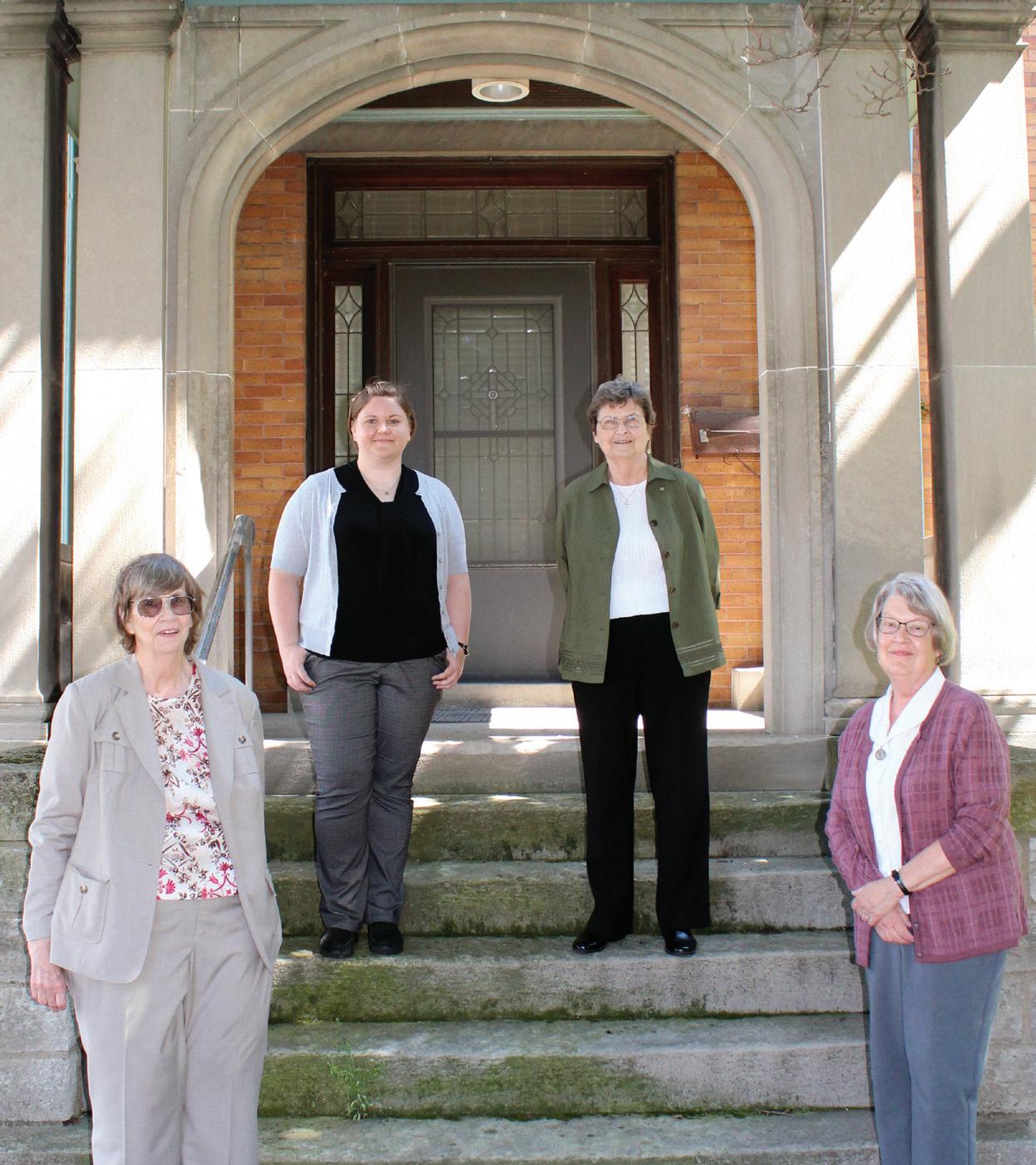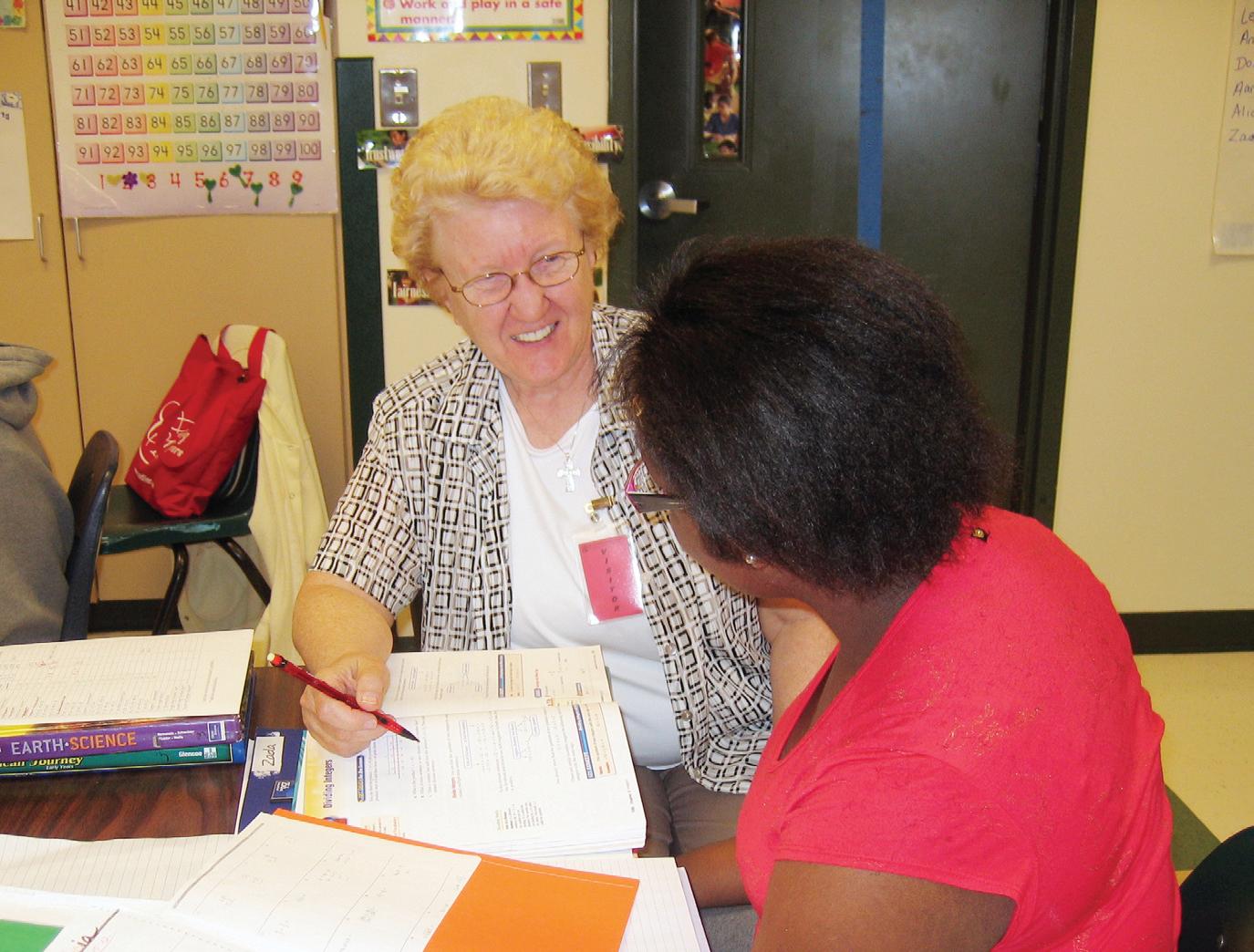
6 minute read
Înventive to Infinity
Inventive to Infinity: Responses to Homelessness
By S. Patricia Wittberg
Advertisement
As the many articles in Intercom this year have shown, homelessness is a severe, and growing, problem in the united States. From their earliest founding, the Sisters of Charity have ministered to those who lack a secure place to call home, and for the past 50 years they have been joined by Associates with a similar passion.
What are some of the ways the Sisters and Associates have responded to homelessness? The first way, of course, has been to prevent homelessness from occurring. A major cause of homelessness is the continuing shortage of affordable housing for persons with low to moderate incomes. To respond to this shortage, Sisters Barbara Busch and Judith Martinez founded Working in neighborhoods in 1978, for the purpose of constructing or rehabilitating housing that low- and moderateincome residents of the South Cumminsville neighborhood could afford, and for training new homeowners in budgeting and home maintenance skills. In recent years, S. Barbara has been joined by Sisters Whitney Schieltz, Brenda Busch and Annette Muckerheide, and WIn has extended its services to more neighborhoods. Last winter, WIn broke ground on its “50 net Zero urban Village” project, which will create 25 new, energy-efficient single-family homes in South Cumminsville, and will also rehab 25 senior citizens’ homes to reduce their energy usage. By the end of 2020, S. Barbara projects that 20 of the 25 senior home rehabs will be completed, and construction of seven new homes will have begun.
Another organization in Cincinnati which is actively preventing homelessness is Santa Maria Community Services, founded by Sisters Blandina and Justina Segale more than 100 years ago. Today, Santa Maria continues its founders’ mission by assisting families through its Tenant education and Stable Families programs. Currently, S. Sandy Howe and Associate Maureen Maxfield serve on the board of Santa Maria, and numerous other Sisters of Charity have volunteered there.
In Pueblo, Colorado, S. nancy Crafton is working to raise money for former migrant farmworkers who cannot afford the newly raised rents on the houses and apartments they currently occupy. Because many of these workers are not documented, they are neither eligible for public housing nor pandemic stimulus money under the CAReS Act. Without help, they, too, will become homeless.
In their ministries at Working In Neighborhoods in Cincinnati, Ohio, (from left) Sisters Barbara Busch, Whitney Schieltz, Brenda Busch and Annette Muckerheide work to provide affordable housing and programs to persons with low to moderate incomes.
Another way the Sisters of Charity help prevent homelessness is by funding other nonprofits that construct affordable housing. Twenty of the 63 nonprofit organizations currently receiving loans from the congregation’s Seton enablement Fund are using this money to build or rehab affordable housing in states from Texas and new Mexico to oregon and Massachusetts.
The second focus of Sisters and Associates, and by far the largest and most varied one, is to minister to those who are already homeless. Some support or serve in emergency shelters. Bethany House, which was started by Sisters Delia Sizler and Mary Grafe in 1983, now houses between
35 and 40 homeless families in seven different buildings throughout Cincinnati. S. Lynn Heper, who currently serves on the Bethany House board, says that families arrive with nothing but the clothes on their backs and, through Bethany House programs, are helped to find a stable place to live. In Lansing, Michigan, S. Pat newhouse has raised more than $30,000 during the past eight years to support Haven House, an emergency shelter for homeless families there. other Sisters and Associates minister to the emotional, physical, and spiritual needs of those who are experiencing homelessness. S. Marie Pauline Skalski volunteered at St. Vincent’s Shelter for Homeless Children in Lansing, Michigan, between 2012 and 2019, where she served in the shelter’s school for those children who were too emotionally fragile to attend the local public school. S. Marie Pauline said that she looked into the children’s eyes on her first day there and felt their desolation, their feeling of ‘I don’t know who I am or where I belong in this world.’ Her From 2012-2019 S. Marie Pauline Skalski volunteered at St. Vincent’s Shelter for Homeless main ministry at St. Vincent School, she said, was Children in Lansing, Michigan, to children who were too emotionally fragile to attend the local to love the children there: to calm them during their public school. meltdowns, to use loving words like “Sweetie” and “Honey” to them, to hold and hug them. the retreats have been put on hold during the CoVID-19 pandemic, the Dayton directors try to keep in touch with other Sisters and Associates attend to the physical needs the previous retreatants either online or by phone calls. one of homeless men, women, and children. S. Tricia Cruise of the retreatants had a baby this fall, and the Dayton ISP heads Healthy Moms and Babes, a ministry in Cincinnati program leaders helped find baby clothes and other necessities that serves the needs of pregnant women who are poor – and for her. In Cincinnati, there are monthly follow-up sessions half of whom are also homeless. The women come to Healthy by Zoom to help the retreatants carry the insights they Moms and Babes for prenatal care before their due dates, received during the retreat into their daily lives. and to receive care for themselves and their babies afterward. Those who have no other home can live for up to 18 months at Segale House Apartments on the west side of Cincinnati, a “fast track” to self-sufficiency. The third way to address the issue of homelessness is to advocate for them with federal, state, and local governments. Here, too, Sisters and Associates have been active. In Pueblo, Colorado, S. nancy Crafton lobbied for
The spiritual healing of homeless men and women who several years to get the city’s zoning designations changed so are recovering from addiction is fostered by the Ignatian that permanent housing for migrant farmworkers could be Spirituality Program (ISP), which offers two-day weekend built. The Sisters at Working in neighborhoods in Cincinnati retreats for them in both Cincinnati and Dayton, ohio. also advocate with city, state, and national leaders for laws Several Sisters and Associates give these retreats for women: and budget allocations that will permit and encourage the S. Teresa Laengle in Dayton, and Sisters Donna Steffen, construction of more affordable housing. And, of course, Martha Walsh, nancy Bramlage, Annie Klapheke and many Sisters and Associates have written letters to their Maureen Heverin, and Associates Anne Shaffer and Kathy government officials and served on boards of organizations McDonald in Cincinnati. The retreats feature talks by the such as the Greater Cincinnati Homelessness Coalition, Sister and Associate directors on “Fear vs. Trust” and “Healing advocating for state, local, and federal legislation that will of Memories,” opportunities for journaling and meditative prevent more people from losing their homes, and will help walks, and a “Witness Talk” by a former retreatant. Many those who already have. Many of these advocacy attempts other Associates and Sisters volunteer to drive the participants did not succeed due to special-interest lobbying or “nIMBY” to and from the retreat. Associate Patty Broughton reports (not In My Back Yard) resistance, but they continue to try. As that the women she chauffeurs are visibly changed by the St. Vincent de Paul said, we all must be “inventive to infinity” weekend’s experience and are eager to spread information when faced with suffering and injustice. For whatever we do about it to others. According to S. Teresa, some of the to the least of our homeless and near-homeless brothers and Dayton retreatants have even attended ISP workshops in sisters, we do for Jesus Christ, who also had nowhere to lay Chicago, Illinois, to be trained to be retreat leaders. Although His head.











